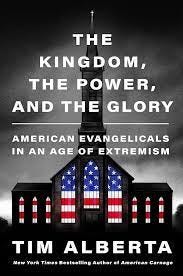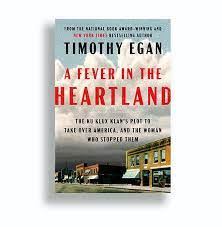Now that my “Fearless Christian University” manuscript is approaching final form, I hope to get back to my previous pattern on posting SubStack newsletters each Monday, Wednesday, and Friday. I’m grateful for the new folks who have recently subscribed (thanks again to Ryan Burge for the referral!). I’m also very thankful for those who have or are reading my manuscript to give me early feedback before submission. While there may still be newsletters about Christian Higher Education, my topics will be more varied than they have been in the past few months.
We’re finally in the throes of the presidential election season (even though the first Republican debate was way back in August). Monday is the Iowa Caucus. A week from Tuesday is the New Hampshire primary. The South Carolina primary is a month after that.
While nobody really knows what’s going to happen in those primaries until elections are over, reporting shows a clear pattern. In the two states with high percentage of white evangelicals (Iowa and South Carolina), Donald Trump appears to be in a very strong position. In New Hampshire, while he’s still leading in polls, Nikki Haley is not far behind and may be surging.
I first became interested in how evangelicals think about elections about this time in 2012. NPR interviewed evangelical voters and asked which candidate they supported and why. I remember one woman describing her belief in small government and low taxes. I thought, “she’s not answering as an evangelical — she’s answering as a Republican.”1 There was nothing about her statements that demonstrated a translation of biblical or theological precepts into political preferences.
In fact, what we’ve seen over several decades is a pattern of sacralizing partisan positions as religious ones.2 Policy differences — from how to handle immigration to service to same-sex couples to taxes to racial history to transgender health care — get placed within a religious frame. That rhetorical shift removes the conversation from a normal political discussion seeking the compromise that would lead to the public good to a protection of one’s position as a matter of Christian devotion.
This has led to some valiant attempts to try to explain what’s happening within certain segments of the evangelical population. Just this week, Ruth Graham and Charles Homans wrote that “Donald Trump in connecting with a different type of evangelical voter”. David French had an opinion piece this morning decrying the ways in evangelical partisans are echoing the kind of othering rhetoric Trump uses, far away from the fruits of the spirit descibed in the New Testament. Also today, Axios’ Sophia Cai had a story about “Maga Pastors”.
I come to this analysis on the heels of finishing Tim Alberta’s excellent The Kingdom, the Power, and the Glory: American Evangelicals in an Age of Extremism. I had been anticipating this book for a long time. For one thing, Alberta writes as an evangelical insider, having grown up the son of a pastor and observing his father’s church take a rightward turn in the Trump years. I was also interested because that church was in Brighton, MI; just 48 miles from where I lived for the last decade before moving to Denver. We even lived on Brighton Road!
The book is part memoir, part reporting, and part Christian reflection. I highly recommend it, even though it is quite depressing in many parts. It tracks how congregations got caught up in Culture War issues around Covid and the Big Lie and made life impossible for congregants or pastors who tried to chart a more faithful path.
Alberta struggles, as will his readers, to fully grasp how and why such a shift in orientation could occur. I’m listening to an audiobook (while doing school pickup) that makes this struggle even deeper. I’m only about a third of the way through it, but it demonstrates that these problems of nationalism within the church (not just Christian Nationalism which has a specific form) have long been at the interface of church, politics, and culture.
This book. Timothy Egan’s A Fever in the Heartland: the Ku Klux Klan’s Plot to Take Over America, and the Woman Who Stopped Them, is another I was looking forward to (and dreading). Having been born and raised in Indianapolis, I knew I had to have this book to learn about the dominance of the KKK throughout Indiana. In the early part of the 20th century, there were more KKK members in Indiana than in any other state.3
I’m only a third of the way through Egan’s book, but it’s already clear that churches and pastors played a critical role in promoting the views of the KKK and supporting the efforts of its leaders attempting to build a political machine around white nationalism. In spite of the horrific character of the KKK leader in Indiana (and he was morally bereft!), the church people went along. Better that than deal with the Catholics, the Jews, and the Blacks.
These two books — along with the many articles on evangelicals and politics that regular cross my media feeds — leave me approaching conclusions that I’d rather not come to. But I don’t think I see another way.
That conclusion (likely connected to spending a year on my book) is that the church people want someone to protect them. They are afraid of “others”. A strong leader can offer them confidence that the changes going on in the broader society won’t impact them. They can see themselves as right and honorable while projecting hostile intent to anyone outside their circle.
That’s why they are sure that society discriminates against Christians. It’s why they believe rhetoric that says “you won’t even have a God anymore”.
This is a crisis of faith. Why does God need voters to protect him? Don’t they believe that God is sovereign? Doesn’t scripture warn against putting your trust in chariots and armies?
We have a spiritual formation crisis in too many churches. That crisis will leave rank and file evangelicals at the mercy of whatever political leader preys on their fears, whether that’s in 1921 or 2024.
Back in 2017, I did analysis of Republicans to determine how those who were religious differed from the rest of the Republicans. On issues of immigration, welfare, environment, and size of government, religiosity made no difference. On moral issues: same sex marriage, abortion, and unwed mothers it did. Ryan Burge has written regularly about the downward shifts in church attendance among evangelical Republicans.
Okay, that is a line from the book describing why the Bob Jones University case got traction from the religious right.
This history helps flesh out why Indianapolis took over three decades to resolve the school desegregation suit brought by the DOJ.






John, did I ever tell you about Englewood Christian Church’s very own story of platforming the KKK in the 1920s? Actually, there are several Englewood neighborhood stories that dovetail with Egan’s book, but one about the church that really stands out in that context.